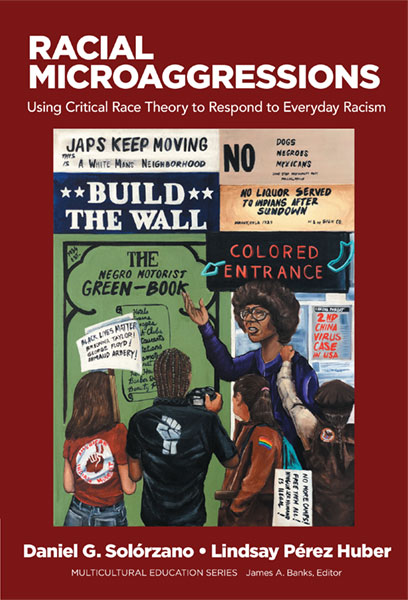Professors: Request an Exam Copy
Print copies available for US orders only. For orders outside the US, see our international distributors.
Daniel G. Solórzano, Lindsay Pérez Huber
Publication Date: September 18, 2020
Pages: 176
Series: Multicultural Education Series

Drawing from over 2 decades of research, this book offers an in-depth analysis of a systemic form of everyday racism commonly experienced by People of Color. Racial microaggressions are layered and cumulative assaults, often carried out in subtle and unconscious ways, which take a psychological and physiological toll on the body, mind, and spirit. The authors make a unique contribution to the study of racial microaggressions by using Critical Race Theory (CRT) to develop the concepts, frameworks, and models provided in this book. Focusing on the lived experiences of People of Color, Racial Microaggressions can be used to disrupt the everyday racism that continues to target so many Communities of Color.
Book Features:
Daniel G. Solórzano is professor of social science and comparative education and director of the Center for Critical Race Studies in Education in the Graduate School of Education and Information Studies at the University of California, Los Angeles. Lindsay Pérez Huber is an associate professor in the Social and Cultural Analysis of Education master’s program in the College of Education at California State University, Long Beach, and coauthor of Why They Hate Us: How Racist Rhetoric Impacts Education.
“ Racial Microaggressions in Education is a timely, well-researched book that draws on the works of other scholars in the field (notably Chester Pierce, who first coined the term microaggression) and provides vivid, real-life examples of racial microaggressions throughout the text. Readers, regardless of their background, will better understand racial microaggressions and be able to pinpoint them after reading this book, enabling them to disrupt the normalized existence of racism in everyday life.”
—CHOICE
“Theoretically and empirically grounded, the authors provide a brilliant and timely contribution to the current discussions and actions related to race and racism. They link theory, practice, and pedagogy in a powerful analysis that spans the roots of racism and the responses to racial microaggressions to the intergroup conflict caused by internalized racism.”
—Dolores Delgado Bernal, chair and professor, Department of Chicana(o) and Latina(o) Studies, California State University, Los Angeles
“‘How can I teach antiracism?’ ask educators motivated by Black Lives Matter activism. You can assign this book! It’s an excellent review of critical race theory and methods. Learn how to examine layered microaggression stories and how to interrupt biased behavior before insulting or assaulting others.”
—Margaret Montoya, professor emerita of law, University of New Mexico
“Timely, relevant, evidenced based, and instructive, this book is essential reading for those who want to commit themselves to achieving racial justice in education. Naming the pain that racism inflicts is vital for eradicating racism, and this book cogently informs us theoretically and practically on how to do so. Thank you, Solórzano and Pérez-Huber, for the quintessential book that we have long needed to understand, dissect, and disrupt racial microaggressions.”
—Tyrone C. Howard, professor, University of California, Los Angeles
“Beautifully written with passion, humanity, and academic rigor, this is an instant classic. Solórzano and Pérez Huber’s book provides an essential examination of racial microaggressions as a key issue facing contemporary educators and society at large.”
—David Gillborn, professor of critical race studies, University of Birmingham
Contents
Series Foreword vii
James A. Banks
Acknowledgments xv
Artist’s Statement xix
Luis-Genaro Garcia
Introduction: Origin Stories: How We Came to Study Racial Microaggressions 1
Danny’s Story 1
Lindsay’s Story 8
Our Stories Coming Together to Further Theorize Racial Microaggressions 14
Overview of the Book 17
1. Laying the Conceptual Groundwork for Understanding Racial Microaggressions 19
Counterstories of Everyday Racism 19
Majoritarian Stories of Everyday Racism 22
Recognizing History to Name Everyday Racism 25
Chester Pierce and the Conceptual Development of Racial Microaggressions 30
Defining Race and Racism 32
Using Critical Race Theory to Theorize Racial Microaggressions 33
2. Understanding the Types, Contexts, Effects, and Responses to Racial Microaggressions Using Critical Race Hypos 37
A Critical Race Hypo 37
Types of Microaggressions 39
Contexts of Microaggressions 41
Effects of Microaggressions 42
Responses to Microaggressions 45
3. Examining the “Micro” Versus the “Macro” in Researching Racial Microaggressions 51
Theorizing the Macroaggression: A Tree Metaphor 52
Macroaggression: The Roots of Racism 52
Institutional Racism: The Trunk and Branches 53
Racial Microaggression: The Leaves 54
Applying the Framework 56
4. Racism Within and Between Communities of Color: Internalized Racism 66
Internalized Racism: The Clark Doll Experiment 69
Internalized Racist Nativism: El Teatro Campesino’s “El Corrido” 71
Intergroup Conflict: The “Blexit” Movement 77
5. Responding to Racial Microaggressions: Theorizing Racial Microaffirmations 84
Theorizing Racial Microaffirmations 85
Examples of Racial Microaffirmations: Existing Literature 88
Examples of Racial Microaffirmations: Our Personal Stories 92
Examples of Racial Microaffirmations: Empirical Evidence 94
6. Conclusion 98
Future Research on Racial Microaggressions: Promising Areas 99
Praxis: Disrupting Racial Microaggressions 106
Notes 111
References 125
Index 144
About the Authors 155
Professors: Request an Exam Copy
Print copies available for US orders only. For orders outside the US, see our international distributors.